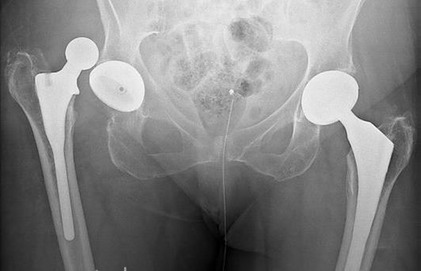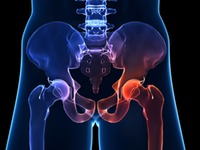What is a Revision Hip Replacement?
A revision hip replacement is an operation on a hip that has already had a hip replacement. It is performed for a variety of reasons but frequently because the previous hip replacement has worn out. The operation involves removing the failed components and inserting new ones. Often additional work is undertaken at the time of the operation to replace damaged or absent bone.
Revision hip replacement surgery is very individualised as each case provides different challenges.

Who Benefits from a Revision Hip Replacement?
Revision hip surgery benefits patients who have a problem with their current replacement. This may include:
- Wear of the hip replacement components
- Loosening of the hip replacement components
- An unstable hip replacement that dislocates
- An infected hip replacement
- Bone loss around a hip replacement
- Fractures around a hip replacement
- Failure of the hip replacement components
What is Involved for the Patient?
- Usually five to six nights in hospital
- A spinal or general anaesthetic (either way you wont hear or see anything)
- The operation takes 90 - 180 minutes
- Old scars are often lengthened and used again
- Often non weight bearing after surgery
- Crutches for six to twelve weeks
- No driving for four to twelve weeks
What is the Recovery Period?
Recovery after hip revision surgery is very individualised. The operation ranges from very simpe to very complex. Some revision surgery reaches full recovery in two to three months. Frequently, full recovery takes six to twelve months but in some complex cases twelve to eighteen months.
What is the Success Rate of a Revison Hip Replacement?
Success rates of revision hip surgery are mixed depending on how severe the initial problem is and what surgery is required. In general a revision hip operation functions at a slightly lower level to that of a first hip replacement.
What are the Risks of a Revision Hip Replacement?
All operations carry some risk. Revision hip replacement is a safe operation but carries higher risks than a first time replacement. This is because of scarring and bone loss.
Risks common to all operations include:
- Infection
- Blood clots in the legs
- Bleeding
- Damage to surrounding nerves and blood vessels
Risks particular to revision hip replacement include:
- Hip instability (the revision hip replacement dislocating)
- Leg length inequality
- Fracture of bones around the revised hip replacement
- Damage to the sciatic nerve
- Loosening of the revised hip components
- Increased chance of requiring a blood transfusion.
Why Have Julian Perform Your Revision Hip Replacement?
Julian is experienced with hip revision surgery. He uses computer assistance for revision surgery whereever possible. Julian has been trained, and has experience, in a variety of techniques for dealing with the challenges that this surgery creates.
Because of the complex nature of the surgery Julian operates on these cases with his colleague and close friend Mr Simon Crampton. Simon is an experienced Christchurch orthopaedic surgeon. Julian and Simon operate together monthly on challenging cases. This is done pro-bono, and on a reciprocal basis between the two centres, at no extra cost to the patient.
Having two surgeons results in a shorter operation which reduces a number of risks. The patient benefits from having double the experience normally present at their operation. Simon and Julian have been very happy with the outcomes they have achieved operating together in this way.
I Think I May Benefit From a Revison Hip Replacement
If you think you may need a revision hip replacement please arrange a consultation with Julian Stoddart. You will receive a comprehensive assessment of your currently implanted hip to determine if this operation is right for you.
Click here to find out how to arrange an appointment.
